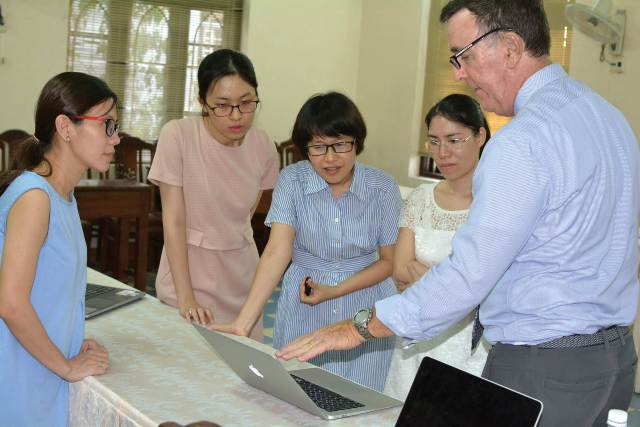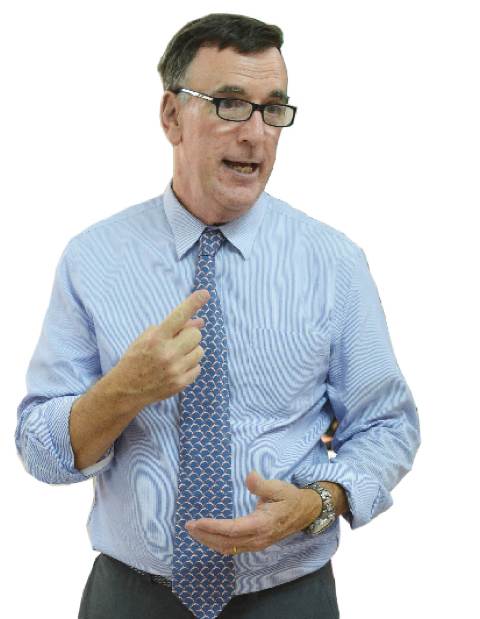
My understanding about Vietnam is that most print news operations are affiliated with a government ministry or department, which helps offset their costs. I do not know how to verify whether and/or how much Vietnam’s readership and circulation have dropped and how their expenses are managed. But Vietnam’s use of and time spent with social media on smart phones continues to grow.
Spending a lot of time researching, watching trend of press development, what made you surprise in the development of this career?
How rapidly things are still changing. How innovative news operations are becoming in their collection and presentation of information. How more people need to pay for the quality of the journalism they are getting.
In your opinion, is multimedia the most powerful form (of press) nowadays?
Multimedia provides new ways of transmitting information to readers/viewers. Journalists must still verify the truth of the information collected and find ways to present that information through a combination of graphic intensive video and slide shows, data visualization, and increased hyperlinking to archived stories and data bases. These multimedia approaches are attracting more people and enabling them to get much more information. But the power of multimedia depends on the choices that editors and reporters make, the quality of the information collected, the effectiveness of the delivery…

Dr. Jay Craig Hartwell. Photo: Linh Tue
Recently, the Washington Post, the New York Times and the Wall Street Journal are three newspapers to charge (fee) effectively on electronic newspapers. Do you think e-newspapers in Vietnam can do this and what conditions are needed?
There are people around the world who are willing and able to pay for quality reporting that helps them make decisions that they consider to be essential to their lives, families, communities, businesses and corporations… If a Vietnam e-newspaper provides that same level of quality, and there is a need for that information, my belief is that those who can afford to pay for it will.
Social network is growing fastly and showing its superiority, how should press behave with social network so not to fall behind?
Social network is a medium to transmit information. Right now, Facebook is the dominant platform through which many people get information from stories their friends share or news operations they follow.
News operations must still gather information, verify it, and package it in multiple ways: for print, online, and Facebook posts that hopefully get clicks. Video with graphics and text has become a popular way to summarize information to quickly capture social media attention. Some believe Virtual Reality (VR) presentation of stories will be a trend that sustains longer engagement with content.
I do not know whether that VR trend will dominate one day, but I believe that news companies must understand how social media users engage with their content to determine how to best present information (regardless of the medium) and strive for the highest quality content. This requires flexibility. Years ago, legacy media (print and broadcast) failed to recognize the potential of the internet and thus lost the opportunity to capitalize on that medium when they still had a monopoly. Their failure to adapt and innovate initially is why so many companies have financial challenges today.
The internet opens the wider door to access the outside world, but there are people to take advantage of the Internet so as to do malicious purposes (bad things). How to limit this?
Good and bad things come through the Internet. People need to become smarter consumers of online information. News and media literacy programs are being developed around the world to help educate… Education is the best way to limit abuse.
With the current press, reporters who want to survive must be good at many things. How to train themselves best and adapt to the development trend in the press?
For me, all reporters should clarify with their editor what his or her expectation is for the story assigned. When carrying out a topic, they should search information and knowledge about it, so they have some background before rushing out of the office. All reporters should remain flexible while on assignment in case they discover that there is a different or better story than what was originally assigned.
Please find ways to humanize the topics that you cover. Every topic involves people. How does a community problem or decision affect these people? Share those stories. Also, try to verify the information you are given (regardless of the source) so readers are getting facts. And please keep getting feedback from peers or editors on how to improve your work.
As you have taught at many universities in Vietnam, what do students need to do to become dynamic journalists after graduation?
I have conducted workshops and presented lectures at several universities, I do know that my students in Vietnam were smart and willing to work hard.
In the United States, students can study journalism in academic courses, but the ones who get reporting jobs also have experience working in campus news operations that are led by students. These students learn important lessons on the job daily, even when they make mistakes. I believe this kind of learning by doing is essential to producing good journalists. Those lessons should not stop with graduation.
The best journalists remain curious about the world with a willingness to ask questions and a desire to always do better than yesterday.
|
“In 27 years of work, this decade has been the most exciting time to be a reporter and a teacher of journalism. The disruptions in the industry and our social systems make us question every month whether we can do more with our reporting and the presentation of what we have learned. A flexible mind is key to handling the change, but the essentials of good reporting have not changed,” Dr. Jay Hartwell. |
By Tue Ninh – Le Thao
